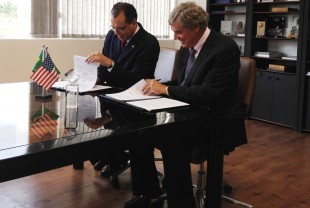Approximately 100 graduate and undergraduate students from Brazil are expected to study at Rice University annually with financial support from their country’s National Council of Scientific and Technological Development (CNPq).

From left, Glaucius Oliva, president of CNPq, and Rice Provost George McLendon sign an agreement that will allow students from Brazil to study at Rice with financial support from their country.
Rice and CNPq recently signed an agreement to facilitate the education of students from Brazil at Rice. CNPq will pay annual tuition and other expenses for fellowships for undergraduates, full and temporary Ph.D. students and postdoctoral fellows, Rice Provost George McLendon said, with the majority expected to be graduate students and postdocs. The first group of six to 10 students is expected to be enrolled at Rice this fall and, within a couple of years, up to 100 students from Brazil may be enrolled per year, he said.
“Brazil has become one of the world’s intellectual and economic centers,” McLendon said. “It is an honor for Rice to be among CNPq’s first partners to educate the future leaders of Brazil in bioscience, energy, technology, health care and other fields.”
CNPq is part of Brazil’s Ministry of Science and Technology. The agency is dedicated to the promotion of scientific and technological research and to developing more scientists in Brazil.
Students from all over Brazil are eligible to apply for the CNPq support. Those selected for the program will be required to meet Rice’s admission criteria.
McLendon said the Brazilian students will broaden the geographic and cultural diversity of Rice’s student body – one of the university’s ongoing goals as part of the Vision for the Second Century. “And we plan to take advantage of the relationships we’re building with universities in Brazil to send Rice students and faculty there to study and conduct research,” he said.
José Onuchic, Rice’s Harry C. and Olga K. Wiess Chair of Physics and professor of physics and astronomy, worked with McLendon, Vice Provost for Research Vicki Colvin and Senior Assistant to the President David Vassar to facilitate the agreement.
“One of the factors that attracted me to Rice was my personal interest in collaborating with faculty and students in Brazil,” said Onuchic, formerly at the University of California, San Diego. “Brazilian students are very high quality, and to be one of the first to establish an agreement with Brazil’s equivalent of the National Science Foundation is a major achievement for Rice and its international outreach programs.”


Leave a Reply